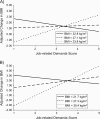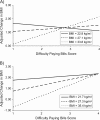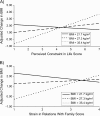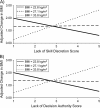Psychosocial stress and change in weight among US adults
- PMID: 19465744
- PMCID: PMC2727271
- DOI: 10.1093/aje/kwp104
Psychosocial stress and change in weight among US adults
Abstract
The association of psychosocial stress with weight gain may have important implications for clinical practice and workplace and public health interventions. To determine whether multiple domains of psychosocial stress were associated with weight gain from 1995 to 2004, the authors analyzed a nationally representative longitudinal cohort of 1,355 men and women in the United States. Change in body mass index was assessed for multiple domains of psychosocial stress related to work, personal relationships, life constraints, and finances, controlling for other factors associated with weight gain. All analyses were stratified by sex and weighted to account for the complex survey design. Among men with high baseline body mass index, weight gain was associated with increasing levels of psychosocial stress related to job-related demands (P < 0.001 for interaction with baseline body mass index), lack of skill discretion (P = 0.014), lack of decision authority (P = 0.026), and difficulty paying bills (P = 0.004). Among women with high baseline body mass index, weight gain was associated with job-related demands (P < 0.001 for interaction with baseline body mass index), perceived constraints in life (P < 0.001), strain in relations with family (P = 0.016), and difficulty paying bills (P = 0.010). Interventions to address psychosocial stress may limit weight gain among overweight and obese men and women.
Figures




References
-
- Landsbergis PA, Schnall PL, Pickering TG, et al. Life-course exposure to job strain and ambulatory blood pressure in men. Am J Epidemiol. 2003;157(11):998–1006. - PubMed
-
- Nielsen NR, Kristensen TS, Schnohr P, et al. Perceived stress and cause-specific mortality among men and women: results from a prospective cohort study. Am J Epidemiol. 2008;168(5):481–491. discussion 492–496. - PubMed
-
- Aboa-Eboulé C, Brisson C, Maunsell E, et al. Job strain and risk of acute recurrent coronary heart disease events. JAMA. 2007;298(14):1652–1660. - PubMed
-
- De Bacquer D, Pelfrene E, Clays E, et al. Perceived job stress and incidence of coronary events: 3-year follow-up of the Belgian Job Stress Project cohort. Am J Epidemiol. 2005;161(5):434–441. - PubMed
Publication types
MeSH terms
Grants and funding
LinkOut - more resources
Full Text Sources
Other Literature Sources
Medical

